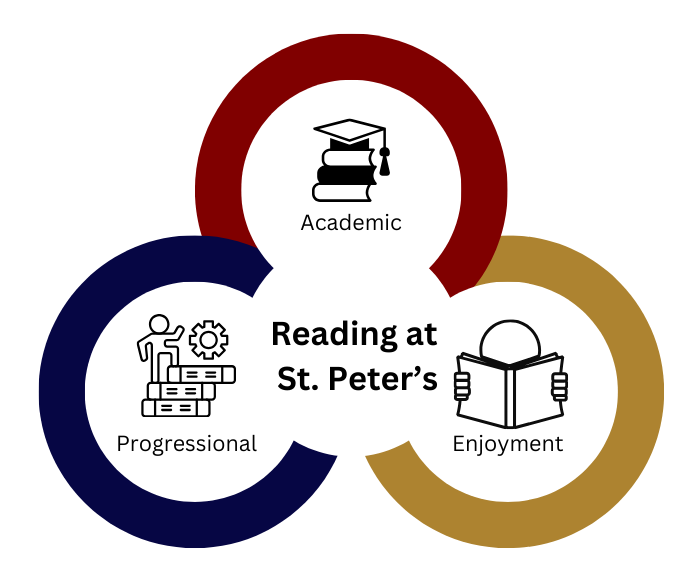Literacy and Reading
‘Reading is a high priority in the school. Pupils with SEND have a planned programme of support in place to support reading. Leaders know the importance of supporting pupils to be fluent readers and are beginning to evaluate the impact of this support.’ Ofsted, July 2022
A high-quality reading culture has three strands:

How do we develop academic reading?
- Integrated Reading in Every Subject: Academic reading is a key part of each subject’s curriculum, helping students engage with a wide range of texts.
- Evidence-Based Strategies: We use reading strategies informed by the Education Endowment Foundation (EEF) to support our students’ reading development.
- Form Time Reading Sessions: Students enjoy reading a set text as a class twice a week during form time, building a shared love of stories.
- Subject-Specific Reading Homework: Every subject includes dedicated reading tasks to reinforce learning and encourage independent reading habits.
- Weekly Reading Activities: During form time, students explore topical extracts to broaden their knowledge and spark discussions.
How do we develop progressional reading?
- Tailored Reading Assessments: We use NGRT testing to identify students’ reading ages and any intervention needs, ensuring personalised support.
- Accessible Data for Teachers: All class teachers have access to reading age data to support tailored learning opportunities.
- Targeted Reading Support: Phonics: Using the "Toe by Toe" program for foundational reading skills.
- Comprehension: The "Lexia" program helps deepen understanding.
- Vocabulary: "Bedrock" supports students in building a strong vocabulary.
- Spelling: "Stareway to Spelling" focuses on spelling accuracy.
How do we encourage a love of reading?
- Book Fairs with Bonuses: Our annual Scholastic book fair includes a £10 voucher for all Pupil Premium students, making books more accessible.
- Celebrating World Book Day: Fun events like the Masked Reader and Extreme Reading challenges bring the school community together to celebrate books.
- Book Buzz for Year 7 & 8: Each student receives a free book to keep, fostering a personal library and a love of reading.
- Author Visits and Events: Students have the chance to meet authors and participate in inspiring events.
- Student Librarians: Our academy librarians help run the library and promote reading among their peers.
- Library Access: Our library is equipped with the Oliver lending system, making it easy for students to borrow and explore books.
- Recommended Reads and Rewards: We provide book recommendations and offer achievement points and trips as rewards for enthusiastic readers.
How do we develop a disciplinary approach to reading?
We use five key reading strategies across our curriculum, adapted as necessary to support reading in all subject disciplines:

Form-time reading programme
Students in Years 7-11 are provided with regular reading opportunities through our form-time reading programme.
Year 7 - Trash by Andy Mulligan
Year 8 - Lord of the Flies by William Golding
Year 9 - Born a Crime by Trevor Noah (Young Readers edition)
Year 10 - I am Malala by Malala Yousafzai
Year 11 - Pigeon English by Stephen Kelman
Reading is supported by class teachers who model reading to their students, alongside the use of knowledge organisers and bookmarks featuring our academy reading strategies. Key vocabulary lists and discussion questions are provided to deepen students’ understanding of the texts they are reading.
Explicit vocabulary instruction
How do we support the development of vocabulary?
- Key Vocabulary in Every Subject: Important subject-specific (Tier 3) vocabulary is identified for each scheme of learning and is an integral part of our curriculum plans.
- Explicit Vocabulary Teaching: We use effective strategies, such as the Frayer model, to help students understand and remember new words.
- Vocabulary Practice: Where appropriate, vocabulary tasks are included in “Do Now” activities at the start of lessons to reinforce learning.
- Targeted Support with Bedrock: For students needing extra help, we use the Bedrock program to build and strengthen vocabulary skills.
